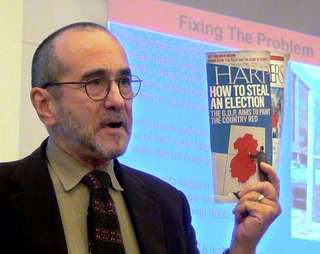Postmodern philosophy is a philosophical movement that arose in the second half of the 20th century as a critical response to assumptions allegedly present in modernist philosophical ideas regarding culture, identity, history, or language that were developed during the 18th-century Age of Enlightenment. Postmodernist thinkers developed concepts like différance, repetition, trace, and hyperreality to subvert "grand narratives", univocity of being, and epistemic certainty. Postmodern philosophy questions the importance of power relationships, personalization, and discourse in the "construction" of truth and world views. Many postmodernists appear to deny that an objective reality exists, and appear to deny that there are objective moral values.

Rhetoric is the art of persuasion. It is one of the three ancient arts of discourse (trivium) along with grammar and logic/dialectic. As an academic discipline within the humanities, rhetoric aims to study the techniques that speakers or writers use to inform, persuade, and motivate their audiences. Rhetoric also provides heuristics for understanding, discovering, and developing arguments for particular situations.

Sexual objectification is the act of treating a person solely as an object of sexual desire. Objectification more broadly means treating a person as a commodity or an object without regard to their personality or dignity. Objectification is most commonly examined at the level of a society, but can also refer to the behavior of individuals and is a type of dehumanization.
The New Culture Movement was a progressive sociopolitical movement in China during the 1910s and 1920s. Participants criticized many aspects of traditional Chinese society, in favor of new formulations of Chinese culture informed by modern ideals of mass political participation. Arising out of disillusionment with traditional Chinese culture following the failure of the Republic of China to address China's problems, it featured scholars such as Chen Duxiu, Cai Yuanpei, Chen Hengzhe, Li Dazhao, Lu Xun, Zhou Zuoren, He Dong, Qian Xuantong, Liu Bannong, Bing Xin, and Hu Shih, many classically educated, who led a revolt against Confucianism. The movement was launched by the writers of New Youth magazine, where these intellectuals promoted a new society based on unconstrained individuals rather than the traditional Confucian system. In 1917, Mr. Hu Shih put forward the famous “Eight Principle”, that is, abandon the ancient traditional writing method and use vernacular.

Black studies or Africana studies, is an interdisciplinary academic field that primarily focuses on the study of the history, culture, and politics of the peoples of the African diaspora and Africa. The field includes scholars of African-American, Afro-Canadian, Afro-Caribbean, Afro-Latino, Afro-European, Afro-Asian, African Australian, and African literature, history, politics, and religion as well as those from disciplines, such as sociology, anthropology, cultural studies, psychology, education, and many other disciplines within the humanities and social sciences. The field also uses various types of research methods.
Commodification is the process of transforming inalienable, free, or gifted things into commodities, or objects for sale. It has a connotation of losing an inherent quality or social relationship when something is integrated by a capitalist marketplace. Concepts that have been argued as being commodified include broad items such as the body, intimacy, public goods, animals and holidays.

Elocution is the study of formal speaking in pronunciation, grammar, style, and tone as well as the idea and practice of effective speech and its forms. It stems from the idea that while communication is symbolic, sounds are final and compelling.

Negative campaigning is the process of deliberately spreading negative information about someone or something to worsen the public image of the described. A colloquial, and somewhat more derogatory, term for the practice is mudslinging.

Ethos is a Greek word meaning 'character' that is used to describe the guiding beliefs or ideals that characterize a community, nation, or ideology; and the balance between caution and passion. The Greeks also used this word to refer to the power of music to influence emotions, behaviors, and even morals. Early Greek stories of Orpheus exhibit this idea in a compelling way. The word's use in rhetoric is closely based on the Greek terminology used by Aristotle in his concept of the three artistic proofs or modes of persuasion alongside pathos and logos. It gives credit to the speaker, or the speaker is taking credit.
Pathos appeals to the emotions and ideals of the audience and elicits feelings that already reside in them. Pathos is a term most used often in rhetoric, as well as in literature, film and other narrative art.

Mark Crispin Miller is a professor of media studies at New York University. He has promoted conspiracy theories about U.S. presidential elections, the September 11 attacks and the Sandy Hook Elementary School shooting as well as misinformation about COVID-19 and vaccines.
Music in advertising refers to music integrated into mass electronic media advertisements to enhance its success. Music in advertising affects the way viewers perceive the brand by different means and on different levels, and "can significantly affect the emotional response to television commercials." It also affects the musicians whose music is featured in advertisements.

Digital rhetoric is communication that exists in the digital sphere. As such, digital rhetoric can be expressed in many different forms, including text, images, videos, and software. Due to the increasingly mediated nature of our contemporary society, there are no longer clear distinctions between digital and non-digital environments. This has expanded the scope of digital rhetoric to account for the increased fluidity with which humans interact with technology.

Dramatism, a communication studies theory, was developed by Kenneth Burke as a tool for analyzing human relationships through the use of language. Burke viewed dramatism from the lens of logology, which studies how people's ways of speaking shape their attitudes towards the world. According to this theory, the world is a stage where all the people present are actors and their actions parallel a drama. Burke then correlates dramatism with motivation, saying that people are "motivated" to behave in response to certain situations, similar to how actors in a play are motivated to behave or function. Burke discusses two important ideas – that life is drama, and the ultimate motive of rhetoric is the purging of guilt. Burke recognized guilt as the base of human emotions and motivations for action. As cited in "A Note on Burke on "Motive"", the author recognized the importance of "motive" in Burke's work. In "Kenneth Burke's concept of motives in rhetorical theory", the authors mentioned that Burke believes that guilt, "combined with other constructs, describes the totality of the compelling force within an event which explains why the event took place."
S. N. Balagangadhara is a professor emeritus of the Ghent University in Belgium, and was director of the India Platform and the Research Centre Vergelijkende Cutuurwetenschap.
Janet Lippman Abu-Lughod was an American sociologist who made major contributions to world-systems theory and urban sociology.
The following events related to sociology occurred in the 1980s.

Multimodality is the application of multiple literacies within one medium. Multiple literacies or "modes" contribute to an audience's understanding of a composition. Everything from the placement of images to the organization of the content to the method of delivery creates meaning. This is the result of a shift from isolated text being relied on as the primary source of communication, to the image being utilized more frequently in the digital age. Multimodality describes communication practices in terms of the textual, aural, linguistic, spatial, and visual resources used to compose messages.
James Rorty was a 20th-century American radical writer and poet as well as political activist who addressed controversial topics that included McCarthyism, Jim Crow, American industries, advertising, and nutrition, and was perhaps best known as a founding editor of the New Masses magazine.
Cancel culture is a cultural phenomenon in which an individual thought to have acted or spoken in an unacceptable manner is ostracized, boycotted, shunned, fired or assaulted, often aided by social media. This shunning may extend to social or professional circles — whether on social media or in person — with most high-profile incidents involving celebrities. Those subject to this ostracism are said to have been "canceled".









